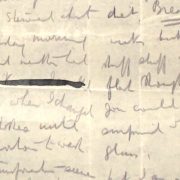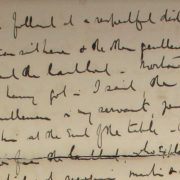10 – Letter to Mary Ann Smith from Frederick Smith, 10 Feb 1900
The copyright of this material belongs to the Royal College of Veterinary Surgeons. It is available for reuse under a Creative Commons, Attribution, Non-commercial license.
Click here for full transcript of letter
[FS/2/2/4/2/10] (1)
*[1]
S.S. Braemar Castle off East London S. Africa
10th February 1900
[Salutation Redacted]
[[1]] Had it not been that I spent 32/- on sending you a cable, the heading on this letter might have puzzled you much has happened since I wrote you last Sunday & now for my story[.]
On Sunday night it became pretty generally known that we were to attack the Boers early next morning 5th Febry at Potgieters Drift, I slept in my things [illeg.] being at 3am & we were in position for the battle by 6.0 the first gun being fired at 6.30.
The fight lasted all that day & found us at night very nearly where we began cer-tainly[sic] no nearer Ladysmith. It was dark but the fighting continued right into the night even as late as 10pm.
One hill of the boer[sic] position was on fire & added to the weirdness[?] of the scene.
I got separated from the regt[sic] & the road being blocked by transport I determined to sleep in a neighbouring field for the night. I did so after making an excellent repast off[sic] biscuit & tinned beef & some tea I thank your excellent Mazawattee[2]. A dinner fit for a King & the tail end of which I was able to share with Jarvis as I recognised his voice in the dark calling out to his carts which were blocking the way. He said next day that I had saved his life. I soon turned in on my native heath & slept like a dog, when I awoke it was daylight & found by my head the car of the big balloon which had come up during the darkness, while we were saddling up I localized[?] the Cavalry about 1/4 mile away & while getting ready to rejoin them the Boers opened fire with shell so vigorously that Cavalry & transport were glad to seek a safer haven. Jarvis had a big ‘find’ of shell which fell near him. All this second day was an artillery duel the sound was deafening, the wounded kept coming in but no sign of our advancing[,] night fell & the fight continued throughout the night at intervals. I slept under a bush & the next morning made a sumptuous repast off[sic] biscuit & tea
On this the third day of the fighting — I was relieved of the 13 Hussars by Houston
[[2]] about 2pm & at once got orders to proceed at once to Maritzburg. I left immediately after introducing my successor & I must say that the chorus of regret at my leaving was most satisfactory.
I was a strange scene, at any moment the Regt might have been ordered into action over head the shells flying like hail from the respective artillery, the sound & roar of which we forgot or became so used to that one failed to notice it, here was an individual bidding fond bye to the Regt actively under fire. Well I rode into Spearmans followed by Morton on the mule & got there just in the nick of time[.]
The Camp Commadt had been ordered to Zululand & was starting with a wagon & 12 mules mules in 10 minutes to join the rail at Frere 30 miles away, the very place I wished to get to. We soon settled details he was only too pleased to take my kit & Morton had a waggon[sic] ride the whole way. I rode my horse. Our first stop for the night was at Springfield 10 miles off. Here we found a detach[sic] of the R.I. Fusiliers & they gave us dinner & a tent, leaving next morning at 5.30 I wrote to Frere 17 miles off & got there at 10am found the train was due in ten minutes, being a mail train they could not take horses, these must follow in an hour or so. In short I got off by this train after making desperate efforts to catch it & was soon on my way to P.M’burg[Pietermaritzburg]. At Estcourt I had the first meal of the day it now being 1 O’clock & such a meal. There is an excellent railway restaurant & 2 helpings to everything going soon filled me up. I got to P.Mb. at 5 O’Clock & Rutherford met me he is in charge here & acting DVO [3 lines redacted] he made himself most agreeable, did everything in his power for me was most anxious I should dine with him at the Club & so on, but I knew what a beast I looked coming straight from the battle field & had not been out of my clothes for four whole days.
I got an excellent dinner at the station & in the evening left for Durban en route to Cape Town. I got to Durban early in the morning looking a veritable beast after all my travelling & previous experience. A poor woman
[[3]] in deep mourning came up to me at the station apologised for speaking but could I tell her whether Ladysmith had yet been relieved. I told her I could tell her definitely it had not been. She sighed, clasped her hands, thanked me & went off. Poor creature! her[sic] son or perhaps her husband shut up. I soon found myself at the point of embarkation & arranged with the steward about a bath, it was now Friday morning & ever since Sunday I had neither had a bath or things off. [1 line redacted] & when I changed after tubbing[sic] hid my clothes until I could give them to Morton to wash.
But what an entire transformation seemed in a few hours. I had come from hell to paradise from misery & human suffering to happiness & health from poverty to riches, from war to peace, I saw white women who all looked lovely, white children that I seemed only to have heard of long long ago, tables, beds, curtains, white bed linen! I could scarce believe my eyes at the sudden transformation to fairy land. No wonder that I woke up last night & unable to realise the situation, thought I had been placed in a hut & wounded, I felt the wall of the cabin & finding it wood settled that I had been carried there off the field & placed on a bed through I could not remember either being wounded or carried there.
I have had such feeds on board, excellent diet. Bread after not seeing it for weeks[,] butter[,] everything. I stuff stuff stuff & need it, for I have lost flesh though in the best of health & you could count every rib. I was surprised when I saw myself in a glass, my face is still peeling but I am in clean clothes, clean everything & having an excellent time of it. There is a baby & a little boy much younger than either of our beauties on board & it is a pleasure & delight to see them & play with them. I keep fancying this may be a dream & dread it ending — We have 40 wounded on board for Cape Town & home. The only other officer is a Captn RHA Headlam[?] who gets off at Port Elizabeth to morrow[sic] for Modder River. I go to Cape Town for orders & then to De Aar.
[[4]] 11th Feb Sunday — We have just left Port Elizabeth & Headlam[?] has gone. We get to Cape Town on Tuesday so this letter will be in time for the English mail which leaves the next day. I hope before I close this letter to give you an account of my interview with Rayment & what he requires me for — I told you that Buller would not get through to the Relief of Ladysmith & news has come on board this morning that he has retired, if so perhaps I am lucky getting away, as the interest in the fighting will now be transferred to the Cape Colony side & further any honourss for the campaign are now more likely to fall to the Cape Colony side than to the defeated troops under Buller. I am sure the latter never sufficiently realized the difficulties of the position — he could only have taken it with 100 000 men & the loss of 10,000 lives.
There was a very fat woman of 50 on board for Durban, she left us this morning [3 lines redacted] we had a most interesting conversation, she is Dutch but married an Englishman, she hated the Dutch & her daughters (who came to see her off & of whose beauty she never tired of dwelling on) were well educated & all married Englishmen. She could not speak English until 12 years of age but had she not told me the fact I could not have detected she was a foreigner. She has had 19 children & was very proud of it she hoped I should have the same number but I told her that I was ignorant of South Africa & its peculiarities but that certainly in England & other countries with which I was acquainted it was the women & not the men who bore the children. She laughed so heartily that I feared impending apoplexy.
Her width of [illeg.] surpasses all description she was wonderfully made & her arms were much bigger than my legs. The two children I mentioned yesterday have not their mother with them the parents & children had to leave Dundee at an hour’s notice & get in the train to escape the Boers, They left in what they stood up in. The father is consumptive & has gone to Las Palmas to die accompanied by his young wife. The two children are on board under the care of a companion lady’s help & a nurse. The latter has a husband (an art master) shut up in Ladysmith now a naval volunteer, she is about 40 years of age
[No Valediction]
(Please note that work on this transcript is ongoing. Users are advised to study the electronic images of this document where possible)
((https://vethistory.rcvsknowledge.org//archive-collection/fs-working-papers/)
[1] Annotated by Smith with ‘Keep’
[2] The Mazawattee Tea Company, founded in 1887 was one of the most important and most advertised tea firms in England during the late 19th century.



